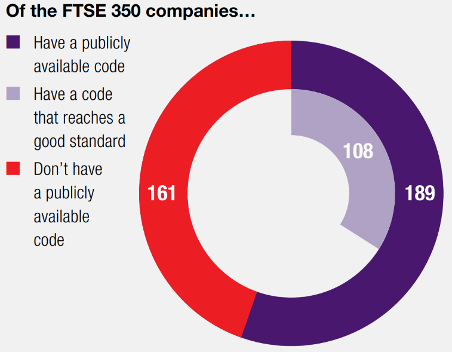Tags: Code of Ethics , Ethical Values, Treatment of Employees
Codes of Ethics can be viewed as a document, or as a foundation for strengthening governance, influencing strategy, shaping culture and building trust with stakeholders. While Codes may represent the backbone of an organisation’s culture, our recent research into FTSE 350 companies found that only high-quality Codes are positively associated with how employees feel about pay, leadership, culture and values, and diversity and inclusion in their workplace. In essence, the presence of a Code is necessary for shaping culture and engaging stakeholders, but it is not sufficient without reflection on quality.
The Journey to The Question
The Institute of Business Ethics (IBE) has spent over 30 years researching and advising on corporate Codes of Ethics. Based on our expertise, we stress the importance of Codes in shaping culture, and our established Code Review Framework help us champion this.
Our 2023 publication which evaluated publicly available FTSE 350 companies Codes against the IBE’s Code Review Framework, revealed that:
- Only 54% of FTSE 350 companies (189) had a publicly available Code.
- Of those, just 57% (108 companies) met IBE’s ‘good’ standard i.e., scoring above 7 out of 10 on our criteria-based review framework.

These findings raised an important follow‑up question: if relatively few organisations have truly good Codes, does the quality of Codes make a real difference to employees’ perception and experiences of their workplace?
The Research Purpose and Approach
The 2025 IBE research conducted by Professor Chris Cowton, IBE associate, and Dr Zezeng Li of Queen Mary University, explored whether Codes of Ethics (by their mere presence or quality) are linked to employee satisfaction and perceptions of their workplace.
The research focused on two core questions:
- Is the mere presence of Codes positively associated with employee satisfaction and perceptions of workplace factors?
- Is the quality of Codes linked to these same outcomes?
These questions were addressed using IBE’s FTSE 350 Codes of Ethics dataset, and employee reviews and ratings from Glassdoor (covering overall satisfaction plus six workplace factors: career opportunities; compensation and benefits; culture and values; diversity and inclusion; senior management; and work-life balance).
The analysis only included FTSE 350 companies with both a publicly available Code and at least 20 employee Glassdoor reviews, to reduce bias and ensure data reliability. This resulted in 105 company data being assessed using statistical techniques for exploring directional relationships, but not causal relationships.
What We Found
The results were striking in their clarity.
- Presence of Codes? No evidence of a link to higher employee satisfaction or better workplace ratings.
- Quality of Codes? A different story. Higher-quality Codes were positively associated with:
- Overall employee satisfaction
- Perceptions of compensation and benefits
- Perceptions of culture and values
- Perceptions of senior management
- Perceptions of diversity and inclusion
However, there were no positive links between Code quality and perceptions of career opportunities, or work-life balance. This nuance matters: even a high-quality Code cannot single handedly address every aspect of employee experience.
Interpreting the Implications
The lesson for boards, senior executives, and ethics practitioners is straightforward: high-quality Codes help align decisions and behaviours with organisational values, making them a core building block of a positive culture for employees. They can help strengthen cultural credibility, support employee retention, and attract new talent.
By contrast, low quality Codes are not sufficient to build culture. A poor quality or non-existent Code risks undermining trust, damaging reputation, and missing an opportunity to influence workplace factors most visible to employees.
Final thoughts
The publication of a Code of Ethics signals effective cultural stewardship; since among other things, it enables scrutiny from stakeholders, including investors. However, our research findings highlight that quality is the key differentiator when using Codes to shape culture. In other words, organisations who want to actively engage stakeholders on culture, should treat their Code as a living document, and appropriately invest in its quality.
High-quality Codes that make a difference are:
- Shaped by organisational values, purpose and strategies, and stakeholder input
- Backed by visible leadership endorsement and effective communication
- Embedded in governance, culture, HR practices, and training programmes
- Clear, comprehensive, and updated regularly (at least every three years) to align with the ever-evolving corporate requirements and challenges
- Accessible and publicly available, as a tool for promoting transparency and building trust with internal and external stakeholders.
In addition, a high score against a recognised benchmark like the IBE Code Review Framework signals that an organisation takes culture seriously and views ethics as a tool to be used by employees and other stakeholders to address concerns and generate ideas.
For business leaders, the question is no longer Do we have a Code? but rather Is our Code good enough to be impactful, while driving responsible growth and innovation?
Author

Dr Samuel Tosin Lawal
Researcher
As a Researcher at IBE, Sam plays a crucial role in supporting the development, delivery, and dissemination of both internal and external research and advisory projects. Sam's passion lies in harnessing the potential of both quantitative and qualitative data to foster a culture of ethical considerations within business practices and policies, ultimately contributing to a broader societal impact.
Before joining IBE, Sam held the position of Research Officer for the University of Reading's Research Culture Project. In this role, he led research initiatives aimed at enhancing the research environment within the university. Additionally, Sam worked part-time as an Associate Lecturer at Henley Business School, where he delivered Undergraduate Business modules and supervised Master's dissertations in Marketing.
Sam holds a degree in Accounting from Babcock University, Nigeria, and an MSc in Business Analytics and Management Science from the University of Southampton. Notably, in 2018, he secured the prestigious Henley Business School Marketing and Reputation PhD Scholarship. This accomplishment led to the successful completion of his PhD in Marketing and Reputation from the University of Reading, where his thesis investigated the malleability of public attitudes and behaviours to organisational stories incorporating stakeholders' perspective.
